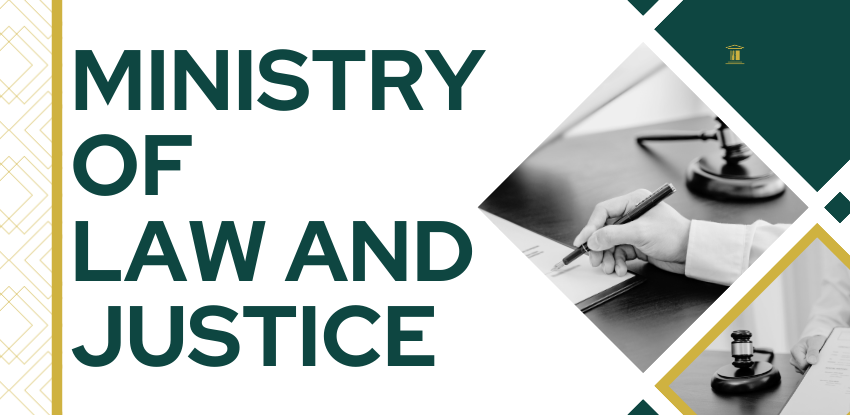+91 9990898327
Office : 632, Dr. Mukherjee Nagar, Delhi 110009
Mon-Sun: 09:00AM - 08:00PM

The Ministry of Law and Justice of India oversees legal matters, legislative activity, and the legal profession.
The Ministry of Law and Justice is important in the Indian government structure because of its extensive engagement in the country's legal and judicial framework. Its importance and roles are :
1)Policy making
2) Modernization
3)Legal representation etc
It is divided into three departments:
1)Department of legal affairs
2)Legislative department
3)Department of justice
1)Department of legal affairs: gives legal advice to the government, appoints legal officers and conducts cases in courts.
2) The legislative department focuses on amendments to laws and legislation revisions.
3)Department of Justice: deals with legal aid and gives justice to people experiencing poverty.
The National Legal Services Authority (NALSA) is a statutory agency in India founded on November 9, 1995, under the Legal Services Authorities Act 1987. Its goal is to provide free legal assistance to eligible applicants (as defined in Section 12 of the Act) and to organize Lok Adalats to expedite the resolution of cases.
The Law Commission of India is an advisory organization established by the Indian government to promote legal reforms and guarantee that the legal system is improved and modernized. It has a fixed tenure and comprises legal professionals, scholars, and practitioners.
The National Legal Service Authority is the central agency responsible for legal aid. It's a body in charge of providing legal assistance and ensuring access to justice for those who cannot pay it. In many countries, such organizations supervise and coordinate legal aid programs, handle funds, and ensure the quality of legal services given.
The Ministry of Law and Justice has recently undertaken measures and reforms to modernize the legal system, improve access to justice, and increase the efficiency of judicial processes. Some examples are digital transformation, alternate dispute resolution, legislative reforms, etc. These projects demonstrate a desire to enhance the legal system's efficacy, accessibility, and responsiveness to societal requirements.
The Ministry of Law and Justice policies can significantly impact the legal framework and governance, leading to changes and reforms. These benefits necessitate overcoming several hurdles to ensure policies are effectively implemented and achieve their intended outcomes.
Legal reforms aim to improve the efficiency and effectiveness of the court system. These include reforming court procedures to reduce case backlogs, revising criminal and civil laws to reflect current challenges, and harmonizing legislation across sectors. However, the implementation of these reforms is beset with difficulties. Bureaucratic delays frequently slow the implementation of new laws and regulations.
The Ministry of Law and Justice's public perception is frequently centred on its effectiveness and efficiency in administering justice and enacting legislative reforms.
The Ministry of Law and Justice engages with international legal concerns in a variety of ways:
1. The Ministry facilitates negotiation, drafting, and implementation of international treaties and agreements. This comprises bilateral and multilateral treaties on trade, human rights, environmental law, and criminal justice.
2. Dispute Resolution: The Ministry represents the government in international legal cases. This includes cases heard by international courts and tribunals such as the International Court of Justice (ICJ), the International Criminal Court (ICC), and arbitration panels.
3. Legal Cooperation: The Ministry collaborates with foreign countries, typically through mutual legal aid treaties. These agreements make cooperating easier in legal situations like extradition, evidence sharing, and judgment enforcement.
The Ministry of Law and Justice works with a variety of international organizations and agreements to promote legal norms, human rights, and justice on a global scale. These bodies are:
1)United Nations
2)International criminal court
3) World Trade Organization
4)Council of Europe
Expected changes or advances in the Ministry of Law and Justice may include measures intended to improve the legal system, increase access to justice, and conform with international norms. Some possible areas for reform are:
1)Judicial infrastructure
2) E-governance and e-courts
3)Strengthening anti-corruption laws
4)Strengthening the human rights framework
India's Ministry of Law and Justice envisions a strong and accessible legal and justice system that upholds the rule of law, provides fair and efficient justice, and protects fundamental rights. Key components of this idea include:
• Access to Justice
•Implementing judicial reforms
• Legal Reforms
The Ministry of Law and Justice is a crucial government body in charge of legal issues, justice administration, and legislation. The ministry is responsible for ensuring the legal system is fair, efficient, and accessible to all citizens.
The Ministry of Law and Justice plays a vital role in legislative processes by conducting reviews and analyses, consulting with stakeholders, providing training, monitoring, and evaluating. The Ministry of Law and Justice ensures that legislative procedures are educated, legally sound, and responsive to societal needs.
The Ministry of Law and Justice provides legal aid to individuals through various initiatives to ensure access to justice, particularly for those who cannot afford legal representation.
The ministry works with international legal authorities using legal frameworks and standards, treaties and agreements, and judicial companies.
Citizens can seek legal counsel, learn their rights, and obtain the assistance required to address their legal issues by contacting local offices, legal aid sergeants, online portals, and websites.
Post a comment